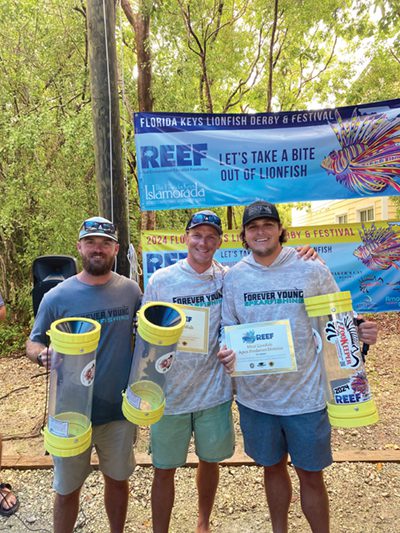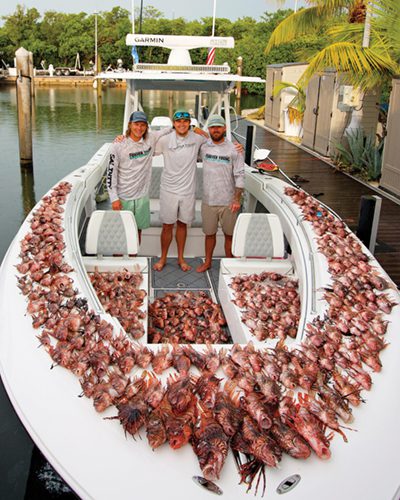
Tournament recap of this year’s Lionfish Derby held by Reef Environmental Education Foundation (REEF). Each year a large tournament is held with the basic goal of removing as many lionfish as possible. Teams from all over Florida come to join this tournament and partake in the festivities put on by REEF. This year, teams brought their best and removed a total of 1,527 invasive Lionfish off the reefs in the Florida Keys. Many of you know about this tournament, why it is important, and what happens if we do not keep these fish in check. But if you are new to the topic or just enjoy reading about the amazing efforts that the community here in the Florida Keys is putting forth for conservation, then this article is for you.
First off, it is important to understand that Lionfish are a non-native and invasive fish. This means they are not supposed to be here and are having a negative impact on our local reef ecosystems. So, what makes them so dangerous? Although their filters are delicious to eat, their bodies are armed with venomous spines that deter any native predators from consuming them. They reproduce in high numbers, every 2-4 days, and they grow quickly. This is not common for most fish, so Lionfish are able to easily overpopulate and out compete native fish for their food. Although Lionfish are not the largest fish on the reef, the average we see is 8-15 inches in length, they have no predators and dominate the sites they make home. They sound like the perfect predator, and they are. Interestingly enough, I often compare Lionfish to pelagic fish like Wahoo or Mahi-Mahi. The reason being, they all constantly feed and grow excessively fast. Lionfish consume prey fish at an alarming rate for a reef species. Every large fish starts out small and the Lionfish prey on the juvenile small fish we all enjoy and love. Yellowtail snapper, groupers, colorful reef fish, crustaceans and inverts all get consumed by lionfish at an alarming rate.

This year, like each year, our team “Forever Young” geared up for the tournament. Over two days we removed 321 Lionfish for our team of four divers. Jeff Tharp, Luke Rankin, Billy Moscatello and I, all look forward to this event each year. Our 321 removed fish landed us with another first place finish, fourth year in a row! Thank you to all the teams that competed this year, the sponsors that made the tournament possible, and especially to REEF for hosting this amazing event! If you would like to learn more about Lionfish, join an education seminar, or participate in one of the coming tournaments, visit reef.org.
If you have the opportunity to try Lionfish on the menu, please do! The filets or whole fried preparations are delicious. While you’re diving, carry a pole spear and remove all Lionfish you see. Remember they are venomous, so handle with care or place them in a container while you are diving. Thank you all for reading along, dive safe!
— Capt. Tony Young can be reached at
Forever Young Spearfishing in Islamorada, FL at 305-680-8879
